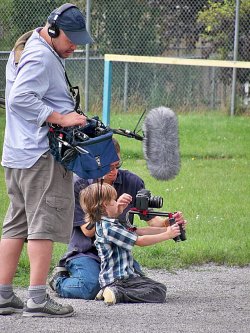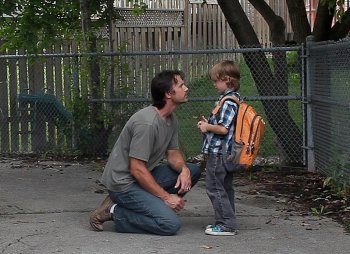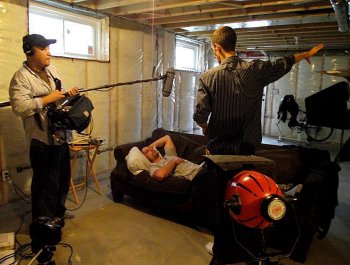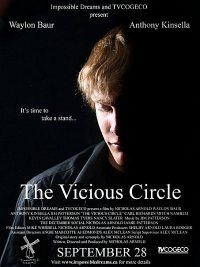|
Your upcoming movie William's Lullaby - in a few words, what
is it about?
Well, what can I say without giving anything away? In a nutshell,
William's Lullaby tells the story of Thomas Splinter, a newly single
father struggling to raise his five-year-old son. Thomas fears his
abilities as a parent but makes a strong effort to build on his
relationship and get his life back on track. The film is an in-depth look
at grief and how children cope with it. There is a slight supernatural
edge to the film as we deal with his depression, insomnia and growing
paranoia, but at its core, William's Lullaby is a very real story about a
single man trying desperately to rebuild a sense of family within his
home. But I've already said too much. Anything more and I start unveiling
what the film is really about! What got the project off the ground in the
first place? Deciding to do it! Honestly. A script can sit
around for years and years if you don't at some point buckle down and give
in to the voices in your head that tell you you're ready. We have to
listen to those voices sometimes as crazy as they may sound. A lot of us
are capable of much more than we think we are if we just take the jump and
I'll tell you, it's amazing how things come together once you set a solid
date and goal for production. Once we committed to making William's Lullaby
happen,
every element of it fell into place over the course of six months. We cut
it close on some things, like locations and even some roles, but it all
came together in the end and if you have faith in the project it always
will. Ultimately, we decided that if we wanted to make feature films, we
might as well start practicing the art of long-form storytelling. You're
not gonna know if you can hit the ball out of the park until you step up
to the plate, and that's what William's Lullaby is. It's a group of
artists, actors, filmmakers, stepping up to the plate and saying:
"This is what we've got!" William's Lullaby seems to touch
some very dark and intimate issues - was any of the screenplay based on
personal experience and the like? And what were your sources of
inspiration when writing your script/how much research went into it?
I would like to think that any film I make comes from a very deep and
personal place. I think when you spend 5-6 years on something, it has
to. Is it based on personal experience? No. I'm not a father, and
haven't dealt with some of the situations Thomas does in this story.
Does it come from things I am questioning in life? Certainly. Are some
of these things incredibly personal? Perhaps. I hope that every film I
make, whether it be the most slapstick, ridiculous comedy or the darkest
horror, comes from a deeply personal place. It's my job as the
storyteller to bury that within a genre, whatever the genre may be. I've
started to learn that an artist does not necessarily need to experience
pain or trauma to show pain or trauma. I think a lot of artists, actors
especially, put themselves through hell and back in order to show
extreme pain. Every person has their method but for me, this is where
empathy and a keen interest in human nature comes in. You can learn a
lot simply by studying those around you, and you can channel that into
your writing, acting, storytelling. Of course it is still wise to look
within yourself and draw upon very real feelings and situations. We all
know what it is to love, hate, feel sadness and anger.
All I will divulge at this stage is that William's Lullaby touches on a
wide range of themes from grief, parenthood and inner demons to
childhood and destiny. All of these themes came from my head. But not
necessarily my life.
 |
Aside from
studying scripts and watching films to get a feel for pacing as I write,
music is always one of the main sources of inspiration for me as a
writer. In a film with "Lullaby" in the title, music guided
the flow of my writing and provided me with the ups and downs, hills and
valleys, I needed to create a balanced story. I also did a great deal of
research -- everything from the effects of depression and how it can
lead to mental illness as well as child development. Hypnotherapy begins
to play a major role in the film and we get to be really creative with
that. I spent time speaking with hypnotists and learning about the
process and effects which was extremely enlightening. The human mind is
a fascinating thing. I've wanted to include the idea of hypnosis in a
story ever since seeing Audrey Rose as a kid.
How
did you approach your story at hand from a directorial point of view?
Patience. This was a quiet script with a lot of elements that balanced
on being executed correctly. With extremely sensitive subject material,
I approached the script with caution and gave myself enough time after
casting to talk with my actors and further develop their characters. We
shot on a very crunched schedule so the more emotional prep we did
beforehand worked to our benefit. More than anything I wanted us all to
be very comfortable with each other. We had to establish relationships
prior to getting on set. You can't throw some of the scenes in this
script at a group of actors and ask them to perform them for you without
having earned their trust first. They just won't do them. As a director,
earning the trust of my cast and crew and establishing relationships
with them will always be my number one priority before anything else.
You really can make magic happen once everyone is on the same page and
comfortable enough to perform at their best level.
 |
It's a very
small and intimate film with a small cast and minimal locations so I
knew it didn't need anything over-the-top from a production stand-point.
I wanted this story to focus in on the people you see. At the same time,
I want it to be a very beautiful film. I hope, despite the heavy nature
of the story, that people are still able to see the beauty in it. That
came from the pacing in the acting, to the cinematography, to capturing
some quiet and very real moments with our young actor that weren't
necessarily scripted. There are times that you see this film through
Thomas' eyes and there are times when you see it through William's eyes
and this is a very beautiful contrast, and it's reflected in the music
-- the innocence of a child versus the jaded reality of an adult.
I'm still
very much learning what works for me as a director. One thing I did was
storyboard the entire film, shot for shot, and this was the first time I
have ever done it and I hope, if I have the time, that I will do it on
every project going forward. It was the best piece of homework I could
have done as it truly allowed me to think about every frame of the film
in my head, months prior to shooting. This giant binder full of sketches
became my bible on set and was an excellent resource for myself, my crew
and my cast so that we all knew what the visual intention was. It was an
invaluable guide and gave me incredible confidence on set. I knew the
film and story inside and out. And when you're that prepared, you become
much more open to suggestions from your cast and crew.
Your
child actor Toby Bisson: How did you find him, what made him perfect for
the role, and what can you tell us about the challenges (but also
advantages) of directing kids in general?
Toby found us! We did a casting call in both Toronto and Kingston,
Ontario (knowing that we'd be shooting the film in Kingston), and we
were sent a video from Toby's family of him dancing to Michael Jackson's
Beat It. It was unusual but captured the youth and innocence
of a five-year-old that we were after so we auditioned him in person and
he won our hearts. We were lucky to find him when we did! William's
Lullaby was Toby's first film but following shooting it, he landed an
agent in Toronto and has since been in numerous productions, everything
from short films to commercials to CTV's Saving Hope and
CBC's Cracked.
He's doing extremely well and we're enjoying watching his success grow!
We'll always be proud of the fact that Toby was our William.
 |
I've worked
with a nine-year-old before, but this was the first time I've worked
with someone as young as five and it's a very different ball-game. Not
to mention, we had two full days in a kindergarten classroom with
fifteen 5-7-year-olds! Yikes! It is a challenge but one you simply get
over. At five, a child actor can't really pull from life experience, so
it really is a different style of directing. With a five-year-old you
have to be very clear about what you want from them or you'll confuse
them. Also pacing your day. You get a different performance from a child
in the morning than you will from them in the late afternoon, so smart
scheduling helps! I have to say I was very lucky with Toby. Part of what
led to our casting him was his maturity. He asked some incredible
questions about William that we would not have expected from a
five-year-old, and this convinced us that he would be able to handle the
weight of the script without being traumatized from it.
Advantages
of directing kids? If you're lucky, you'll get a truth from them that
you'll be hard-pressed to find anywhere else. And that's worth the
potential hassle!
Richard Roy
Sutton plays Toby Bisson's dad. What can you tell us about him, and how
did he and Toby work off one another?
Richard made this thing happen, man. We are so, so lucky with him. He
sent us a tape which impressed us enough to meet him in person and we
cast him a day or so after that. He knows how to walk into a room and
own a part. It was enthralling to work with an actor who has a process
that works for him. He knew how to manipulate his skill and approached
the character with passion. Richard poured himself into this film and
bared it all. He is incredibly vulnerable in this role. I may be
extremely biased, but I really think this is his best work so far and I
am so excited to get it out there. What Richard does with this character
is nothing short of brilliant. I say it's his best work but he is so
hard-working and passionate about developing his craft that I fully
expect him to knock something else out soon that further blows me away.
On that note, I know I'll be working with him again.
|

|
Getting Toby
comfortable with Richard was one of my main concerns in the beginning.
They have some very intense scenes together. I think Richard always had
a sensitive eye on Toby. We all were concerned with keeping our young
actor emotionally safe. At the same time, Richard didn't let that hold
him back in his performance, which is a difficult thing to do and takes
skill as an actor. There is definitely something that clicks on the
screen with those two, as much as there can be given that they portray a
very fragile and cracked relationship. But you would think they are
father and son.
A few words
about the rest of your key cast and crew? Just a few words?
I have so much to say about them. Well, Amanda Shaw is working on some
great films right now in Toronto. She held the film together from a
producing stand-point and is a brilliant, logical thinker. Stephen Lee was
an incredible partner-in-crime during the early process of getting this
film together and was an invaluable asset on set. Mike Whissell, my sound
designer, has always been my number two and we're working hard every day
at bringing this film to completion. He's brilliant. And we're on the same
page. Without his "yes", I would not have made William's Lullaby
… at
least not right now. I could list the rest of my crew, and they know who
they are. So I'll save those 'thank you's for the right time. Each of them
added their incredible, personal touch to the film, and that list of
people is still growing, even in post. Ila and Robert Lawton are brilliant
actors. Their roles were written for them and they own them. Robert's
scenes with Richard are extremely exciting for me as a director. What can you
tell us about the shoot as such and the on-set atmosphere?
Intimate story meant intimate crew for me. We were only a crew of about
seven, and with only maybe four-five crewmembers on set at a time. Very
quiet. Very close. Very personal. Yet with a professional air about it.
It was essentially a closed set and this was all to protect the
integrity and emotional content of the script. I think it helped Toby a
lot that the set seemed so small. For his first film, he wasn't being
thrust before forty or fifty adults he doesn't know. He knew each of us
by name and everyone developed a personal relationship with him. We shot
the film in 16 days, back to back, which is a tough schedule to execute
especially for a feature length film. But when you're pulling people
from jobs and from different cities, you gotta do what you can in the
time you're given. We knew this going in and so we took the time to
appropriately plan for it. Everyone brought their "A" game. I
am incredibly proud of what we achieved that summer. Those two weeks
were intense but incredibly satisfying and I have some life-long
friendships that have come out of it. I will always value everyone's
contribution to making William's Lullaby happen.
 |
As
far as I know, as we speak William's Lullaby is still in post. So
how far along is the movie, and any idea when it might be released?
We're wrapping up sound design! We'll be moving on to foley in the next
few weeks and the score is being completed by Paul Barton -- brilliant
musician with a deep-rooted understanding of what a film score needs!
And as we speak I am prepping the film for colour correction. Still a
few months of work ahead, but we're well aware of the fact that once we
put the film out there it's out of our hands and after five or so years
of development, we are soaking up every last minute with it that we can.
I anticipate screenings starting to pop up towards the end of 2013 but
definitely early 2014 and onward. Keep your eyes peeled!
Let's
go back to the beginnings of your career: What got you into filmmaking in
the first place, and did you receive any formal training on the subject? We're
looking back on my career already?! I honestly can't tell you what got me
into filmmaking. I've wanted to do it since I was five-years-old. I only
know I was five because I received my first toy video camera for Christmas
that year and began making backyard films with my siblings. It grew from
there. I have no way of explaining it, other than I knew from the earliest
age I can remember, deep within, that telling stories, entertaining,
filmmaking was what I was meant to do -- cheesy but that's me. At least I
can say I didn't take an A/V class for an easy credit! I did finally get
some training on it though. I attended Vancouver Film School in the Film
Production program in 2009. That said, taking the plunge and making my own
films has always been my greatest film school -- and continues to be. Provided
my information is correct, you made your first documentary, The
Crippled Lamb, at age 14. Obviously, you just have to talk about that
movie, and lessons learned from it! You are correct! That
one will always hold a special place in my heart. I made that with the
specific intention of wanting to learn how to edit and piece together a
movie professionally. Prior to that I had only ever done amateur movies
that never really went past my living room "theatre". The
Crippled Lamb followed the real-life Sempowski family and specifically,
Brain Sempowski, a nine-year-old boy living with Muscular Dystrophy. It's
a fifteen minute film that I believe shows the love and incredibly zeal
for life this little boy has. In case you're wondering about the title, it
came from one of Brian's favourite books - a book that mirrored his desire
for purpose and meaning in his life. This film taught me the basics. I
shot it, cut it, scored it, narrated it. That was a lot to take on and
resulted in a huge learning curve. But it ended up winning at a few film
festivals, raising money for the Muscular Dystrophy Association and won
Best Film at the Sprockets International Film Festival (a branch of the
Toronto International Film Festival) in 2005. No matter how old it may
get, I'll always be proud of that baby. It means a lot to me. Some other films of
yours you'd like to talk about, and what made you switch from documentary
to drama eventually? And what can you tell us about your evolution as a
director?
I always had the intention of making narrative dramas. I actually think
making a documentary is an excellent way to learn if you have no clue
how to make a film properly. Most documentaries do have a narrative and
so you are learning how to tell a story. Your subjects become your
characters. The difference, or course, in working on a narrative drama
is with the script and actors. Everything is much more controlled.
You're creating a world whereas in a documentary you are capturing a
world. Both are effective. I don't think I'll ever shy away from doing a
doc again. When I come up with a story or theme I want to tackle I have
to ask myself what the best way to execute that story is. Oddly enough,
I was originally planning on doing The Crippled Lamb as a narrative
short until I realized that I had a better, real-life story right in
front of me. So it all depends. The story dictates how I'm going to tell
it.
|

|
In 2005, I wrote, directed and produced The Vicious Circle
-- a feature film on bullying and hatred in high schools, something that
easily could have been tackled as a doc but I felt hadn't been properly
tackled from a scripted, narrative perspective and I wanted to try my
hand at that. That's where it started switching. I love working with
actors and shooting The Vicious Circle over the summer of 2006 was my
greatest lesson in filmmaking and leadership so far. I learned a lot! Of
what to do and what not to do. The years working on that film are
invaluable and I will always pull lessons from them. That's part of why
I try to keep detailed journals during these processes! We shot The
Vicious Circle without any knowledge of cinematography or filmmaking.
Our goal was to create a film about kids, made by kids and that's what
we did. I've since learned a lot about the trade and have begun to
develop a style of my own. I'm very excited about getting William's
Lullaby out there because I feel, after a few shorts in between, it
truly shows where I am at today with my filmmaking and storytelling.
Other than that, I'm still very much evolving. This is the beginning.
But I do believe that when I'm an old man, sitting in my rocker, I'll
see The Vicious Circle on my shelf and still be very proud
of making that film.
Any future projects you'd like to share? Not
until they're shot! Until then, anything could happen… How
would you describe yourself as a director?
Learning. Plain and simple. I'm not an expert yet, I'm far too young for
that, but I am confident in my abilities thus far and I have stories to
tell. That's all I can hope for right now. I hope that William's Lullaby
shows signs of bravery and control as a storyteller because telling this
story certainly puts one in a vulnerable position. And I think we
tackled it with some wonderful sensitivity and respect. Other than that,
ask me in 50 years!
Filmmakers
who inspire you? Steven Spielberg, for his legacy. Jerry
Lewis, for his career and chutzpah. Charlie Chaplin, for his seamless
blend of comedy and drama. Your favourite movies?
 |
Feeling lucky?
Want to
search
any of my partnershops yourself
for more, better results?
(commissions earned) |
The links below
will take you
just there!!!
|
|
 |
The
Sixth Sense, Into
The Wild, Man of La Mancha, The
Exorcist, Forrest Gump … The list goes on... ...
and of course, films you really deplore?
Deplore? No, not
really. I guess every movie serves its purpose for the audience it's after.
I'm a bit annoyed with the torture porn genre. The first Saw
was brilliant, maybe even the second one, but then it just got a little
crazy. I always imagined the writers sitting around a table coming up with
the most inventive ways to murder someone. It's one thing if that propels
the story forward, as it did with the first Saw. It's another
thing entirely if it is solely for shock and entertainment. That's a
little gross to me. And it really has desensitized us in an unfortunate
way. Otherwise, I love to hate The Room. What a great/awful
movie. Your/your
movie's website, Facebook, whatever else?
www.williamslullaby.com
www.facebook.com/WilliamsLullaby
www.twitter.com/Lullabyfilm
lullabyfilm.blogspot.ca
Anything else
you are dying to mention and I have merely forgotten to ask? Not
for now. Great questions! Thanks
for the interview!
Thank you!
|